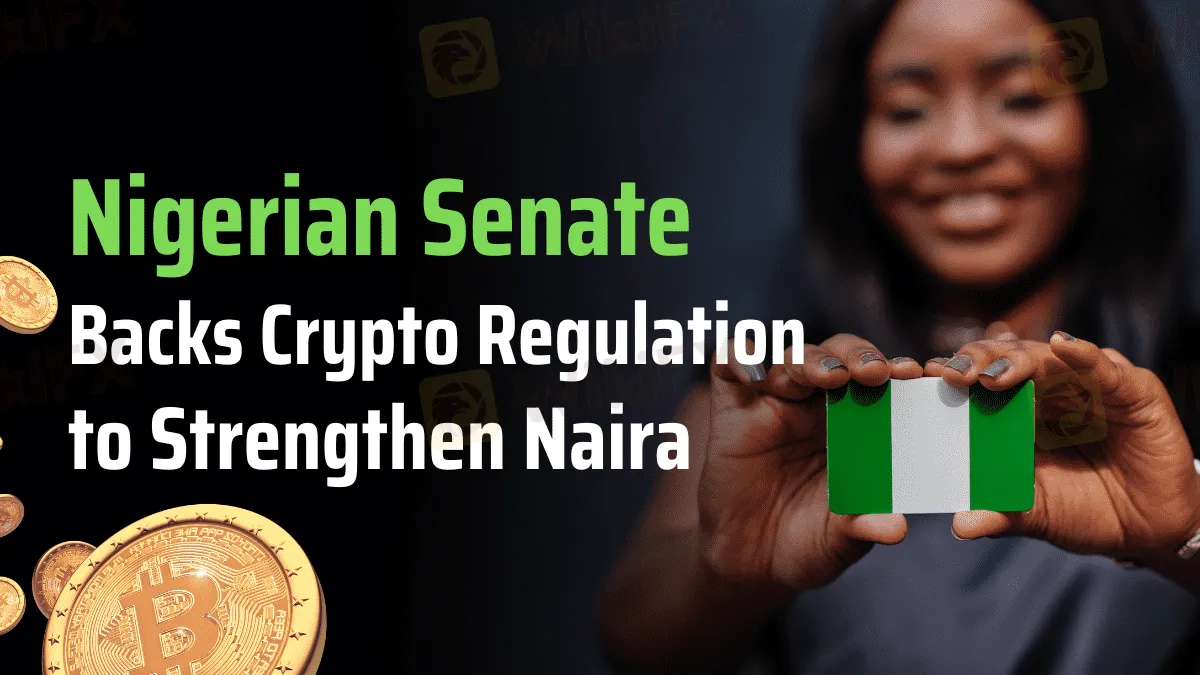简体中文
繁體中文
English
Pусский
日本語
ภาษาไทย
Tiếng Việt
Bahasa Indonesia
Español
हिन्दी
Filippiiniläinen
Français
Deutsch
Português
Türkçe
한국어
العربية
Nigerian Senate Backs Crypto Regulation to Strengthen Naira
Abstract:Meta Description: The Nigerian Senate supports cryptocurrency regulation to safeguard investors and strengthen the naira amid inconsistent policies. This move aims to boost economic stability and attract investments.

The Nigerian Senate Committee on Capital Markets has supported cryptocurrency trading regulation to strengthen the local currency and safeguard investors. The committee's move follows worries about Nigeria's confusing digital asset policy, which might hurt the country's economy.
The committee chairman, Osita Izunaso, noted Nigeria's inconsistent cryptocurrency legislation. The Nigerian Securities and Exchange Commission (SEC) has indicated a readiness to regulate crypto assets, but the CBN has consistently suppressed its expansion. Inconsistency has confused and may cost the nation economically.
Izunaso made these statements after the committee heard from recently appointed Nigerian SEC director-general Emomotimi Agama. Izunaso said that Nigerians have continued to trade crypto despite the CBN's attempts, making regulation the only feasible option. Nigeria may lose out owing to its ambiguous cryptocurrency posture, he said.
The February 2021 CBN order banned banks from supporting crypto transactions. Policy changed when previous CBN governor Godwin Emefiele left. Reversing this command was a great step toward balance.

However, Binance was raided for accused currency speculators when the naira rapidly depreciated against the U.S. dollar earlier this year. Global crypto exchanges were ordered to delist the naira, and Binance was punished for currency manipulation.
Nigeria is one of the top five Bitcoin-interested nations despite these hurdles. This shows how important Bitcoin is to the economy.
To protect the naira, Izunaso advised Bola Tinubu to build capital and crypto markets. He believed that improving these markets would increase financial system liquidity and reduce economic pressure on the local currency.
“That's hammering the naira and making it weaker against other currencies. However, developing our capital market and crypto market will increase system liquidity. That will ease our issues ”Izunaso said.
Pro-innovation Emomotimi Agama promises to revive the Nigerian capital market. He wants to launch creative initiatives that create world-class firms and change the market narrative. Agama supports the committee's recommendation for a more organized and regulated crypto ecosystem to attract investments and boost economic development.
In conclusion, the Nigerian Senate Committee on Capital Markets wants explicit cryptocurrency trading regulations. This step is crucial for investment protection and naira strengthening. The committee's call to action aims to enhance Nigeria's economy and stabilize its currency via digital assets.

Disclaimer:
The views in this article only represent the author's personal views, and do not constitute investment advice on this platform. This platform does not guarantee the accuracy, completeness and timeliness of the information in the article, and will not be liable for any loss caused by the use of or reliance on the information in the article.
Read more

Philippine Banks Launch PHPX Stablecoin to Transform Payments
Philippine banks introduce PHPX stablecoin, backed by bank collateral, to streamline $9T stablecoin transactions, remittances, and cross-border payments.

Bank of America Launches FX Services in the Philippines
Bank of America begins foreign exchange (FX) services in the Philippines, eyeing a share of the $300 billion onshore currency market. Learn about their growth plans.

“Seeing Diversity, Trading Safely”: WikiEXPO Dubai 2024 Opens New Horizons for the Fintech Industry
Dubai, UAE — The WikiEXPO Dubai 2024, hosted by WikiGlobal, successfully concluded on November 27, attracting wide attention from the global financial technology sector. The event was co-organized by WikiFX and the Australian Computer and Law Association (AUSCL), with strong support from the Mauritius Financial Services Institute (FSI) and the government of Liberland. Through an innovative hybrid model of online and offline participation, WikiEXPO Dubai 2024 achieved an impressive 1,267,886 online views and gathered 3500+ on-site participants, bringing together 550+ industry leaders and attracting close coverage from over 1300+ global media outlets.

BaFin Issues Warning Against Clone Broker Exploiting Pepperstone's Identity
The German Federal Financial Supervisory Authority (BaFin) has recently flagged a fraudulent clone of the licensed retail FX and CFD broker Pepperstone. This fake entity, operating under the domain pepperstone.life, has been offering financial and investment services without obtaining the necessary regulatory authorisation.
WikiFX Broker
Latest News
Justin Sun Invests $30M in Trump-Backed World Liberty Financial
Kraken Closes NFT Marketplace Amid New Product Focus
Robinhood Launches Ethereum Staking with 100% Rewards Match
Broker Review: Is FOREX.com a solid Broker?
Philippine Banks Launch PHPX Stablecoin to Transform Payments
Elon Musk Warns of Imminent US Bankruptcy | Bitcoin Retreats from $100K
WikiEXPO Global Expert Interview: Advanced Practices and Insights in Financial Regulation
Pros & Cons of Automated Forex Trading
Magic Compass Sponsors World Taekwondo Poomsae Championships 2024
Trump tariffs: President-elect is serious but it\s not about trade
Currency Calculator


